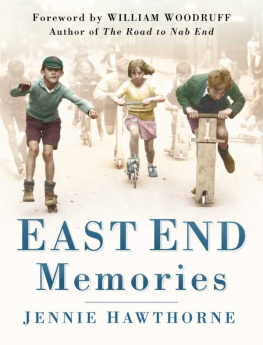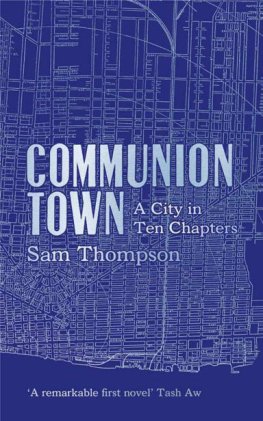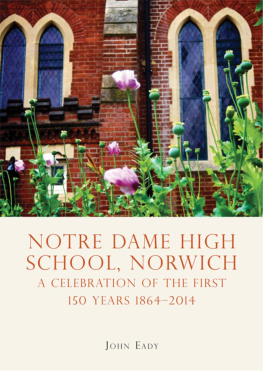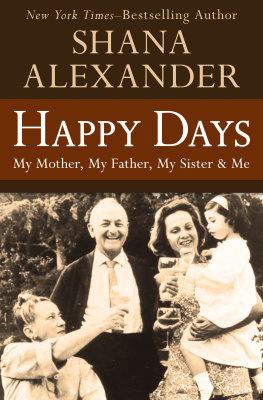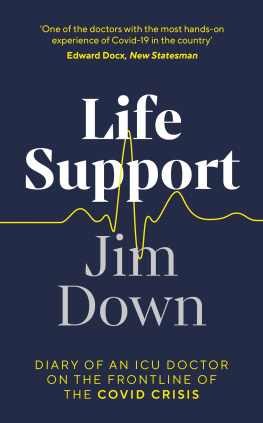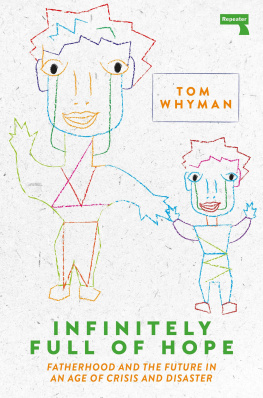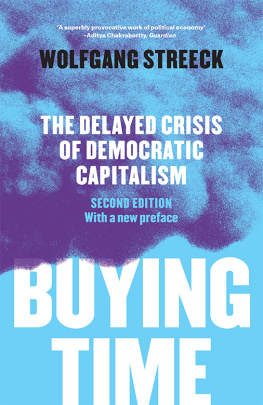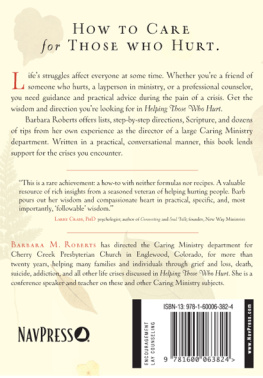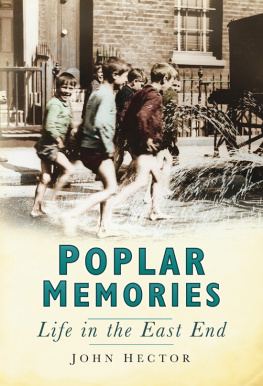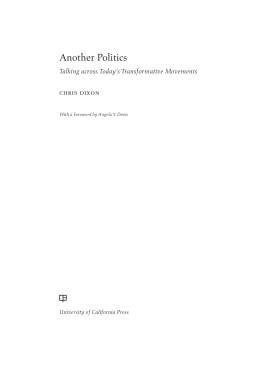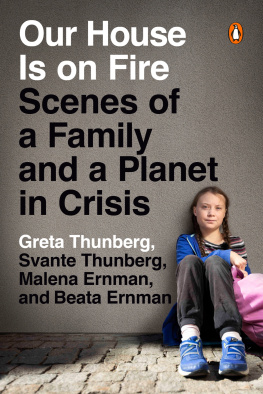EAST END
Memories
EAST END
Memories
JENNIE HAWTHORNE
Foreword by WILLIAM WOODRUFF
Author of The Road to Nab End

First published in 2005 by Sutton Publishing Limited
The History Press
The Mill, Brimscombe Port
Stroud, Gloucestershire, GL5 2QG
www.thehistorypress.co.uk
This ebook edition first published in 2013
All rights reserved
Jennie Hawthorne, 2005, 2013
The right of Jennie Hawthorne to be identified as the Author of this work has been asserted in accordance with the Copyright, Designs and Patents Act 1988.
This ebook is copyright material and must not be copied, reproduced, transferred, distributed, leased, licensed or publicly performed or used in any way except as specifically permitted in writing by the publishers, as allowed under the terms and conditions under which it was purchased or as strictly permitted by applicable copyright law. Any unauthorised distribution or use of this text may be a direct infringement of the authors and publishers rights, and those responsible may be liable in law accordingly.
EPUB ISBN 978 0 7509 5430 3
Original typesetting by The History Press
LIST OF ILLUSTRATIONS
FOREWORD
by William Woodruff
H ere is a wonderful book about a girl born in poverty in Londons East End, who never gave up the struggle to survive and do something with her life. Jennie Crawley (Hawthorne) was born in 1916 in Bethnal Green, one of the East Ends tougher boroughs. Her resolute English Protestant mother was a Mrs Mop, who spent her life cleaning up after others. Her irresolute, gullible (yet most lovable) Irish Catholic father who forever sought the job that in a world depression did not exist happily drank his way through lifes difficulties. We are told that he wore a smile that only a saint could have possessed.
The hand-to-mouth existence under which the Crawleys lived would have tested any saint. The author describes her fathers fight for jobs at the docks; the bodies covered in rags that came alive as we passed them under the arches on our way to our Whitechapel school; the lice crawling over the head of the girl at the desk in front.... Hunger often was the worst burden to bear. Sometimes the child was overcome by the sight and scent of other peoples food. She recalls the Dutch herrings taken from great smelly barrels, the saveloys and hot salt beef, and cucumbers pickled but not too sour, the jellied eels, such a lovely glassy green.... Food in those far-off days was a benediction, like berries from a bush or apples blown from a tree. The desperate conditions of the late 1920s and early 1930s would eventually give rise to the extreme fascist and communist groups of the East End, which Jennie Crawleys Catholic Church denounced.
Regardless of the setbacks, Bethnal Green, to a child, was a magical place, vibrant and alive. Every day her street became awash with a tide of humanity: a fairground, where every kind of people played their part. Sharp wits were everything.
This book brings out the extraordinary ethnic mix of the East End. From 1900 until 1910, large numbers of Jews fleeing poverty and persecution in Eastern Europe had swarmed into the East End. Long columns of refugees from Poland, Lithuania, Russia and Italy followed. Irish refugees fleeing mid-nineteenth-century famine had preceded them. At school in the 1920s Jennie swam happily in a sea of immigrants. There was hardly an English name among us. Fighting for a living, these groups did not have the time or the incentive to fight each other. Waving a Union Jack on Empire Day, and celebrating St Patricks Day with bunches of shamrock, she says, they somehow found homogeneity.
In 1926 Jennie Crawley made her First Communion, which stood out like a peak in the valley of our lives not least because of the feast that followed. Mrs Silverman, an elderly Jewish friend whom Jennie helped, celebrated the occasion by giving her a gold-plated necklace with tiny Jewish charms. Neither of them could have possibly imagined that the necklace would later land Jennie into trouble on a trip to pre-war Nazi Germany.
It is to the credit of this girl that she allowed nothing to stifle her love of life, or lessen her determination to improve her lot. Discarding self-pity, and with enormous strength of will, she began to excel at school. After passing test after test, in 1937 she eventually took up residence at Oxford University. I was as smitten by Oxfords beauty, she writes, as a besotted lover.
Alas for Jennie, her dream was not to be. Fate intervened and the world went to war. Because of family affairs and the need to hang onto a job, she found herself back in Bethnal Green.
Several times during the war her life hung on a thread. She was in a street, she tells us, that got blown to bits... the survivors were screaming for help. We could not help them for we had to be dug out ourselves.
Despite incessant bombing and the unbearable miseries of war, life went on and the war went on and the Cockneys of East London, of whatever ethnic background, remained unbowed. In all the chaos, Jennie hung onto a job, found a husband and started a family. In 1946, a year after the war in Europe had ended, Jennie Crawley, now Mrs Hawthorne, joined her Air Force husband in Germany.
East End Memories is a tale well and vividly told. It provides an absorbing and lasting picture of a girls struggles to find a place in society, a society now gone. Its added value is that, in viewing society from the bottom of the social pile, Mrs Hawthorne is able to draw upon the life she lived. There is no make-believe here. The writers aim has been to capture the life of a poor East End community at a particular moment in time. In this, she has succeeded.
William Woodruff
Author of the best-selling Nab End books
INTRODUCTION
T he tale unfolded in the following pages covers the period from the First to the Second World War, a period of the greatest social and scientific changes the world has ever known. Cheap air flights, TV, mobile phones and personal computers have transformed the lives of ordinary people everywhere. In my childhood, there were no refrigerators, frozen foods or take-aways, no dishwashers, tumble dryers, no ball-point pens with which to sign a name, and no credit cards either. Most working-class homes lacked electricity: lighting came from gas mantles or candles. Alexander Fleming discovered penicillin only in 1928 and we had not heard of antibiotics.
Social changes took a little longer to make their impact but were even more revolutionary. Marriage came first and sex afterwards. Babies arrived yearly, so Marie Stopes and her teaching were more in demand than Viagra or IVF are today. The word gay had a different connotation and closets were not for coming out of but for putting clothes in. There were no meaningful relationships except chaste ones within the family circle, and divorce was only for film stars.
This is the world in which I grew up. It is probably alien to todays teenagers, their parents and even grandparents, but my story has a wider relevance. Our expectations and aspirations, along with those who had them, were killed off by two terrible wars. Today, people aim, hope and often work hard for material comfort and personal happiness. The two do not always go together. If happiness proves elusive, I offer two sayings heard in my youth, one from my husbands Irish aunt, which goes, Money doesnt make you happy, but with it you can be dd miserable in comfort. The other sounds like a biblical phrase, but isnt. It comes from my Cockney mother, who replied, when we asked for something beyond her power or inclination to give: He that expecteth a lot, receiveth nothing. Neither entirely true, but useful to remember if dreams ever become nightmares.
Next page
